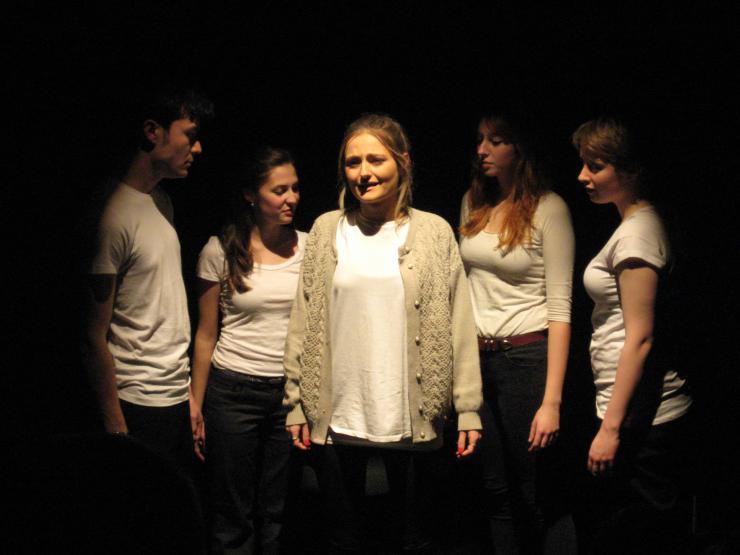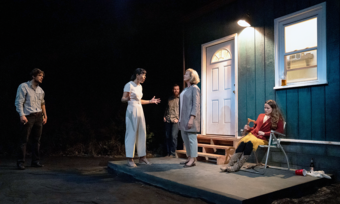Why I Will Never Be a Starving Artist
I graduated from college with a playwriting degree, and one year later, I hadn’t written a single new play. I was ready to call myself a failure as a playwright. Get up, move on. My inspiration had dried up, my motivation was gone and I couldn’t have come up with a decent idea for a new piece if you paid me. And I certainly needed the money.
It’s not as though I was lacking in experiences to be inspired by. My first job out of college was as an intern for an online entertainment magazine in Brooklyn, a position which, among many other things, allowed me to write theatre reviews. They didn’t pay me for it. It was the only unpaid position I applied for in those last few months of college, the only internship so valuable I was willing to work without pay. Because I was a new college graduate in the midst of a recession with a Theatre degree and middling-at-best connections in the theatre world, they were the only ones who offered me a job. Go figure.
In my year at the magazine, I got to expose myself to all the New York theatre scene had to offer, from ten-seat tiny white box productions to Broadway shows with celebrity leads. Everywhere I went, I was surrounded by inspiring works of theatre. And yet, struggling to make ends meet between several part-time gigs, I couldn’t bring myself to be inspired.
After the tech company that ran the magazine went under, I got a job doing marketing for an Off-Broadway theatre. I thought, “Finally, I get to be in the room with people who make theatre happen, seeing it all come together. Surely this will be inspiring.” But not only was it a part-time job where the pay was atrocious, my boss was also constantly trying to nickel-and-dime me out of every cent she could while working me to the bone. Frustrated by the lack of respect and of opportunity, I left theatre.
Fast forward a few months later to me working a corporate marketing job and an approved application to move into a much nicer apartment at the end of the month. Sitting on the subway anticipating my usual irksome trek back to Brooklyn, the words came to me. A few turns of phrase, a monologue, a witty snatch of dialogue—by the time I was home, I had written the first scene of my new play on the Notes app on my phone.
I fiercely admire driven artists who are inspired to generate work on an empty stomach, not knowing if they’ll be able to make next month’s rent. But we do ourselves a disservice when we imagine that the “starving artist” is the only model for young theatremakers getting their start in the big city or elsewhere.

Six months after that fateful evening, I had my first staged reading of the play that became my New York City playwriting debut in a 24-hour play festival, which I never would have thought I’d be accepted to. Shored up with the stability of a well-paying job, a non-decaying apartment, and a supportive network of friends in the city, I can write again. And the future looks bright.
We’ve all read one of those articles that debates what’s better for artists: a job tangentially related to the art you want to make, while struggling to find time and energy to do what you really love, or a completely unrelated day job that allows you the freedom to care about your art completely in your free time. And I certainly don’t want to say anything bad about all those arts administrators out there, but I certainly know where I stand in that debate now.
I fiercely admire driven artists who are inspired to generate work on an empty stomach, not knowing if they’ll be able to make next month’s rent. But we do ourselves a disservice when we imagine that the “starving artist” is the only model for young theatremakers getting their start in the big city or elsewhere.
We know that playwriting is almost never a lucrative occupation on its own, and thousands of talented writers all over this country are quietly eking out their existence as public school teachers, lawyers, bartenders and more. And those of us who get our writing in after our nine-to-five jobs are no less dedicated or significant than the guitar virtuoso in his crumbling Brooklyn loft.
So can we stop talking about starving artists, as though commitment to the craft can only be proven through stockpiles of ramen and cheap vodka? How about we celebrate the young woman who trudges out to class three times a week after a full day of work in the office to earn her MFA? Or the high school teacher whose opening night is completely sold out because all of his students came out to support him when he debuts his first full-length play? And what about all of the writers out there who are also parents?
The romance of writing isn’t negated if you’re not constantly inspired, despite all the odds. You are no less of a person if you don’t want to starve for your art, and how you choose to make it all work is no one’s business but your own. Be proud of the writing you do, and if it isn’t happening as quickly as you would like because of your other commitments, that just means you have more time to reflect on your work as you create it.
I have never felt so much like a playwright as I have since I got a full-time job outside the arts. And I never would have had the inspiration to write this blog article without it.











Comments
The article is just the start of the conversation—we want to know what you think about this subject, too! HowlRound is a space for knowledge-sharing, and we welcome spirited, thoughtful, and on-topic dialogue. Find our full comments policy here
I can appreciate your decision and path for your lifestyle as an artist. I don't think there should be one proscribed version of what it means to be an artist.
But I do think it is very much worth insisting that it should likewise not be a requirement to have a job unrelated to the arts to be an artist. I am beginning to see a wave a people forced into this pattern, and unfortunately I see from many of the people on this path, an acceptance that it is not worth the time and effort to advocate for more funding for the arts and for artists.
I don't think having a day time job makes your art a hobby at all. But it definitely takes away from your time as a possible educator in the arts, and a political advocate/organizer for the arts. I can imagine that if the same money was available for you to teach younger people playwrighting skills, or to visit the elderly and scribe their lives into scenes as civil service work, or use your marketing skills for an artists union...that you would gladly do so.
The danger in the path you have chosen is that is sets a precedent for others, and allows the forces that be to point to it when those of us committed to the arts full time/overtime demand that things change to be more equitable for artists.
So while I applaud you on your happiness, which is not easy to find as an artist, and should be cherished...I write here to call this all to attention so that it informs how you present the situation in the future.
Because it is a situation that could lead for some people if they had to work a job like this...to incredible depression, angst, and eventual forcing out from the arts if it becomes the only way to survive.
Thanks for your perspective. I don't mean for my path to be any more or less "right" than anyone else's. That's the point. Some people devote their lives to their art, others teach or work as arts administrators, and still others find a place outside the arts to make a living. Certainly some people can be discouraged from their art by having a day job, just as I was by NOT having one.
As I said in the article, I fiercely admire artists who can make it work without a day job. But I will never be able to do that. My point is that we should accept every artist for who they are and the path they take. I am a believer in defining one's "career" as the profession that we are most invested in, rather than the one we spend the most time working at.
And would I love for the arts to pay well enough that we could all just do what we love all the time? Of course. But that's a long battle we have to fight, and rent won't wait in the meantime.
Thank you for writing this. My art is currently lost in the deep, dark, depths of the struggle of life nearly a year after I earned my MFA in Acting. Hope looms. :)
Congratulations on your MFA! That's no small feat either.
I'm a Gen-X'r not a millennial. But this article really spoke to me. Looking back on life - I went too far in the opposite direction. I let my corporate jobs consume me. Now a little older and wiser - I see that it's not an all or nothing proposition. You can do both. In fact, you must. And it's much nicer to write in peace in a comfy home - then trying to write while worrying if the lights are going to be shut off. Thank you for writing this!!! I'm constantly moved by how thoughtful and wise the younger generation is!!!
Thank you for sharing your experience. I don't think anything about the "starving artist" idea is unique to being a millennial. If anything, it's a phase most artists confront at some point in their journeys and have to come to terms with, whether we choose to embrace it or to find another path.
This is just what I needed to hear. I am about to have a staged reading of my second full-length play and I agree--I would not have been able to get here without support from family, friends, and now the co-workers at my day job. I constantly find it difficult to find language and examples of the FT working playwright/writer of any genre so I can argue against the little bad voice in my head that says the only way to do it is to kill myself as a "starving artist." Thanks for giving me more ammunition to fight that voice and create from my free hours not on the job.
Exactly! We're all out there struggling in whatever way we can, and it's nothing to be ashamed of.
I did both at the same time. There is nothing quite as valuable in the arts as youth. Not only are people attracted to the beauty of youth, but they want to invest in both the present and future of the artist's work. As a young person, I formed my own military contracting firm and used my writing skills to write proposals and contracts. At the same time, I wrote numerous produced musicals. I took my laptop and a recorder everywhere I went. When the business became successful beyond my dreams, I hired drivers so I could write while traveling.
The musicals though a lot of work were like mini-vacations from the tedium of the other form of writing and the productions were like visiting a spa. I loved it and still do.
What a great story. I spend my workdays writing tweets and email blasts, and my colleagues are always amazed when I come up exactly the right words for a tagline. It's all about using what you've got.
You're so right. It seems to me that writers need enough time with people to get inspiration and enough time alone to realize the product of that inspiration.
I wrote about this in my blog (dosaguilas.org)...and it was nowhere as awesomely-written as this was. THANK YOU!
Thank you so much!
Thank you for this beautifully honest blog! Sadly, there is too much shaming around jobs to pay the bills in this industry by the artists themselves. Ironically, we as creatives are seeking a different path, but too often times find that there is an acceptably "right" way to be an artist and a "wrong" way. Nonsense. All the best to you! May we all continue to seek what serves us best as artists and human beings.
Best of luck to you too!
Preach. I am hopeful that we are closer than ever to breaking the cycle of shame and silence around art and money. I don't believe you have to suffer for your work; in fact, I think that if you can cover those basic needs well and predictably, you're much better placed to make thoughtful, thought-provoking art. Thanks for writing this piece.
Thanks for your support!
Well said! I also worked a law firm job in NYC for nearly a decade, during which I wrote multiple plays and had my first productions. Very few playwrights can start (or sustain) a career without supplementing.
Great to hear that you had such success! And that yes, we can count that as a success, day job or not.
Thank you!!! While living in nyc, working in law-firms made my art possible. Back then (late 80's) a 1 day proof-reading certificate from learning annex got me in. Then i found out the temp agency was billing me out as a paralegal. Typed up a new resume and it led to those 24 hour firms on gigantic cases that needed liads of eyes. Some firms let me make my own hours, bought me dinner, put me in a towncar to Brooklyn after late nights working.
Gotta balance art & commerce to maintain dignity. Unless a trustfund baby.
Thanks for sharing your story! We all do what we can to make it all work.
BRAVO! This piece resonated with me. Having a full time job provides you with the necessary finances to follow your dreams. Unfortunately, arts jobs are few and far in between. They are not impossible to get, but you have to build connections and work hard. Thank you for writing this.
Thanks for the support!